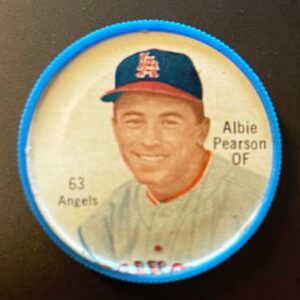

Want To Pursue Second-Act Significance?
Start With These 3 Steps
Gary Schneeberger
May 25, 2022
As a baseball-mad boy growing up in Southern California in the 1940s, Albie Pearson dreamed of being a big-leaguer. At 6, he snatched his mother’s blue satin pillows from the house and made a makeshift diamond in the backyard.
Each “game” featured the same ending. Swinging a bat all alone, he’d mime hitting a home run against the New York Yankees to win the World Series. He rounded the bases to the imagined roar of the crowd, joyous over what he hoped would be the crowning achievement of the baseball career he longed to have.
As he crossed “home plate,” though, he heard something else. A voice in his head saying, “Join my team.” He wasn’t entirely sure what it meant and forgot about it as quickly as it came to him.
Pearson went on to get his shot at the majors, playing for a few teams before coming back to Southern California to join the Los Angeles Angels. Just 5’ 5” tall, he was what sportswriters call a “scrappy” ballplayer, one who would win the 1958 American League Rookie of the Year Award and hit just 28 home runs in his 10-year career.
 One of them came against the Yankees, off six-time World Series champ and eventual Hall of Famer Whitey Ford. As soon as he deposited Ford’s curveball over the right-field fence, Pearson didn’t celebrate, though. He recalled that voice in his head three decades earlier and realized what he had just achieved would not be his life’s most significant moment.
One of them came against the Yankees, off six-time World Series champ and eventual Hall of Famer Whitey Ford. As soon as he deposited Ford’s curveball over the right-field fence, Pearson didn’t celebrate, though. He recalled that voice in his head three decades earlier and realized what he had just achieved would not be his life’s most significant moment.
I was close to Pearson in the late ‘90s. He’s the father-in-law of my pastor at the time in Palm Springs, Calif. When he told that story to me, a fellow baseball fanatic, he said the thought that struck him as he traversed the bases was, “Is this all there is?” His boyhood dream had come true – and he realized it wasn’t his dream at all. Serving others as a pastor – joining God’s team, as the voice he heard at 6 had implored him – was where he would find his life’s true purpose and calling over the next 50-plus years.
I’ve thought of Albie a lot during the last several weeks, as our BEYOND THE CRUCIBLE podcast series Second-Act Significance has unspooled. The beats of what he went through – discovering that there was a richer life on the other side of what occupied years of his attention and effort – has echoed in the stories our guests have shared.
Their experiences have highlighted three truths that stretch throughout their journeys – whose details are as different as their demographic profiles. They offer a roadmap for how to scratch that “Is this all there is?” itch Albie Pearson felt in the 1960s.
1. It’s never too late, or too early, to pursue a next act in life that brings you more significance
Robert Miller wanted to make music his career from the first time he picked up an instrument in high school. But his dreams were deferred by the usual beats of life – a successful career that took him in another direction, family joys and responsibilities, and a crucible in his 40s when he broke his neck in an accident.
But in his 60s, he grabbed his guitar and launched his band Project Grand Slam — and finally felt the rush of playing original songs at festivals and concerts around the world. The group has released 11 albums of its unique brand of rock-Latin-jazz fusion.
Miller didn’t just think about his longing to make his dream come true. He had to act on it. Even if his 60th birthday had just passed.
“I said to myself, ‘If I don’t do it now, when the heck am I going to do it?’ ,” Miller explained on the podcast. “I decided if I’m going to do something, if there’s really something left that I want to do, when am I going to do it if I don’t do it now?”
Yvette Bodden, a young mother going through a heart-rending divorce, faced that same decision. As the life she knew unraveled, she slowly found blessing and purpose she would not have discovered without going through that crucible. Bodden stepped into her calling as a thought leader who inspires women – through her Web platform Awakened Woman — to dream big as they pursue their own passions by exercising their giftings.
“You can fall 100 times, but you can rise up,” she said on the podcast to describe Awakened Woman’s counsel to readers. “I know it sounds simple, but I want to inspire that fight in other women. And I feel my writing is doing that.”
2. When you set out on a journey to new significance, follow your heart and lean into your talents
Melissa Reaves wasn’t sure how her life was going to be OK again after she was fired from her well-paying advertising job. But the assurance of her inner voice gave her the courage and inspiration to embark on a new career that has become a mission – helping professionals use the power of story to write happy endings for their businesses.
She coaches clients to make what she calls mind movies that add depth and meaning to their communications. Doing so has allowed her to tap into her youthful affinity and talent for acting – reviving a part of her she had allowed to atrophy a bit in her initial career choice.
“I deep down always thought I would be an entrepreneur,” she said on the podcast. “When I was 25 years old, I thought, ‘I have taken Toastmasters. I am an excellent speaker. I am going to teach people Toastmasters.’ But I was only 25. I then went, ‘I’m not ready for it.’
“But that entrepreneurial Melissa was born inside me. So, when I was stepping out of the smoldering flames (of being fired) and I started to listen to my higher self — all of a sudden, my second half now is on my terms. It’s my life.”
3. Starting small is OK because it’s starting
Erik Orton’s dream job as a playwright and theatrical producer came to a crashing halt when his off-Broadway show was closed after only a few performances. The failure left him fearful and rudderless – until his curiosity about sailing became his family’s passion for it and they steered their boat’s rudder on a 5,000-mile journey from New York to the Caribbean.
What Erik and his wife Emily learned on the trip, with their five kids sharing the adventure with them, was how to turn worry into wonder and the importance of building confidence, credibility and calm. Those are truths they now teach others through their speaking, writing and coaching.
And it could not have started any smaller.
“I’d go down to this high rise in the financial districts every afternoon and I’d work 3 till midnight,” Erik said on the podcast of the job he took to make ends meet. “I would take a dinner break right around sunset, and I would walk along the Hudson River. I would see these sailboats that just carve their way up and down, silhouetted against the sky.
“During my dinner break, Emily and I would get on the phone, and we would talk as we try to figure out how to dig ourselves out of this hole we found ourselves in. She was happy that I would see these boats and that they gave me a sense of peace. As I described it often enough, I realized that there was a sailing school right downstairs, and that’s where these boats were coming from. She said, ‘You should go check it out. Maybe you’d want to learn how to sail.’ ”
Second-act significance looks different for each of us. But the steps to get there, to scratch the “Is this all there is?” itch, can be followed by any of us.
Reflection
- Do you have an “Is this all there is?” itch you’ve been wanting to scratch? What’s holding you back?
- What are the skills and passions you have that can serve you if you start on the journey to a life of greater significance?
- What would significance look like for you if you grab hold of that next act in your life? Why would that be more rewarding and fulfilling than what you’re doing now?
Get The Whole Story – Listen To The Podcasts
- Robert Miller, Episode #112 – Click here to listen
- Yvette Bodden, Episode #116 – Click here to listen
- Melissa Reaves, Episode #113 – Click here to listen
- Erik and Emily Orton, Episode #111 – Click here to listen

